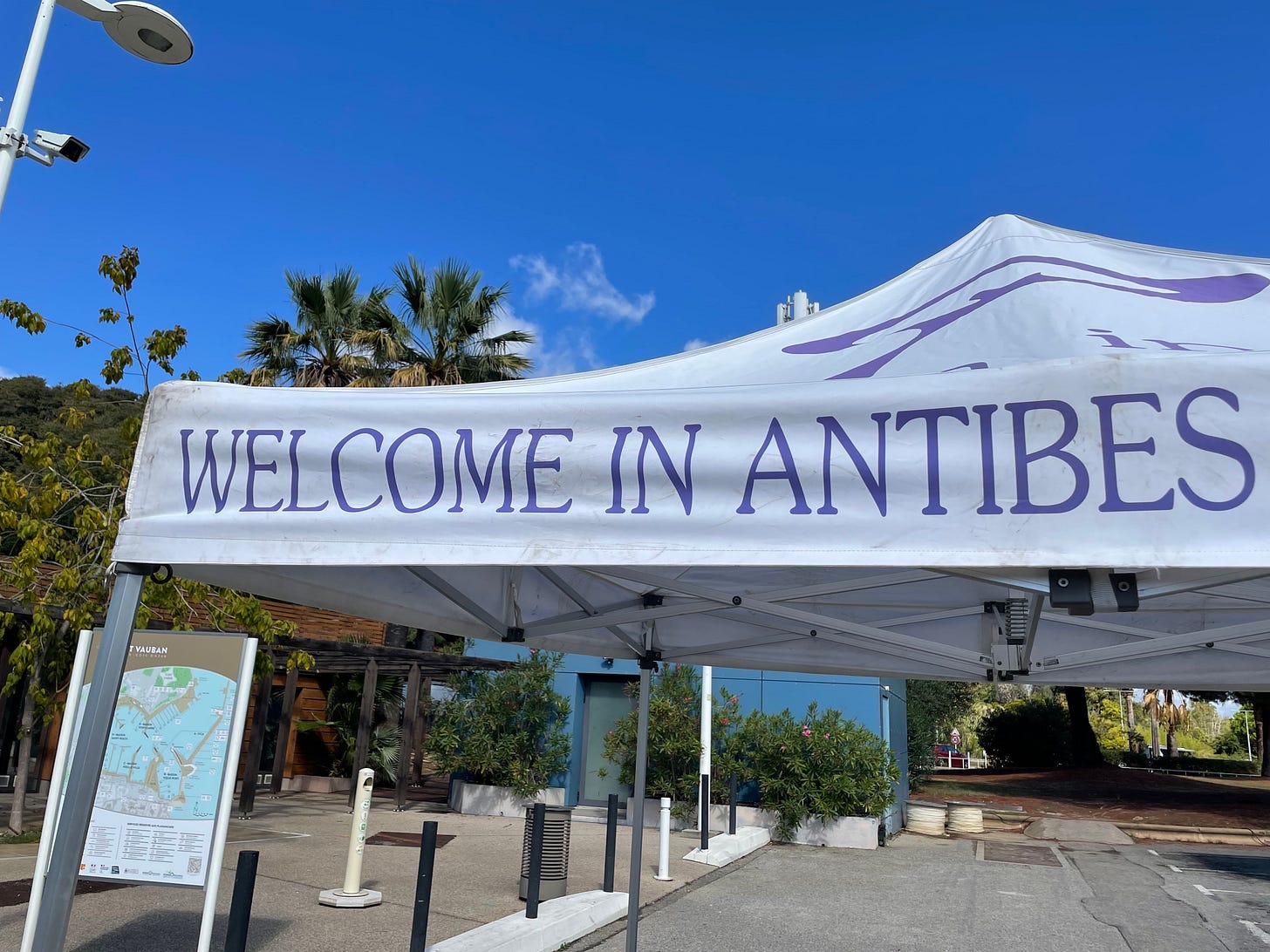73–From a futon in France.
But it also eats away at a more core belief around who I am, and how this project negates or reaffirms my identity: if I truly were a writer, then I would drop everything and follow his lead...
Traveling as a 17 year-old in 1968 and a 40 year-old in 2022 are different, to say the least.
I originally hoped to trace my travels along the same path my father took and to stop and read his letters with the same timing and in as close a geography as I could. But a quick calculation showed that to be difficult.
For one, he hitchhiked. His path was the roads of 1968, and his route was determined by who would take him where and when. His plans, often, were not so much plans as a response to what was offered. (Entire letters are taken up with curses for greedy drivers who refuse to stop, descriptions of wet fields where he slept, frustrations at having no autonomy or flexibility or, ironically, freedom to be where he wanted to be or when.)
For another, his letters are not a travelog. An entire letter describes a conversation; another catalogs every feeling felt in a day; one a haircut; two are spent responding to letters that have been lost to time. Recreating a trip which itself is not recorded is not only impossible but meaningless.
The third reason is my own mishegas: I wanted to read the letters for the first time while recreating the trip—as close to how he’d written them as possible. I wanted to discover his voice while discovering where he’d been, not in my condo in Las Vegas or at the Cheesecake Factory having lunch. But I couldn’t ascertain the contours of the trip without first reading the letters. The very nature of my desire—to recreate, to experience the novelty of place and passage at once, where he was when he wrote—made my desire impossible.
I had to settle for this: aim for a spot in the middle, dig in, and read. Today I’m on a rickety futon inside a small Airbnb in the old, coastal town of Antibes (Latin: Antipolis). This apartment was certainly around in 1968 (the plumbing implies as much), but it’s unlikely my father did anything more than pass by on the streets below, or streets near the streets below. (In the letters, he explains—obliquely, in passing—that he stayed with his friend’s grandma, a situation he never embellishes nor ever describes).
I walk outside the flat; I turn right and venture into the vieille ville. The winding streets are shaded—yesterday, it rained—and the air is crisp but warming. There are clothes hanging off balconies, and open doors behind which vacationing Italians and Brits are having lunch before deciding to beach or to shop or to eat more (or all of the above). Most everyone I pass is either elderly or vacationing. Is this where he stayed? Is this where Maurice’s grandma lived? Is this where he ventured out to write his letters and survey the land and sea?
I turn left: I’m in the new town. The streets are broad, the buildings tall and modern; the buzz is that of a normal place at midday. Kids are leaving school for lunch, backpacks on, arms linked, change in their pockets for a coke, or snack, or bus fare home. If I cross through the shopping streets, and turn, and turn, I enter the residential area, with apartments and houses, open parking spaces and a view, on many sides, of the water in the small, blue distance. Is this where he stayed? Is this where Maurice’s grandma lived? Is this where he ventured out to write his letters and take stock of the land and sea?
Part of me still wishes I’d done it; is still angry for not at least trying to recreate and follow his entire trip, pass by pass. But where would I have gone: to each return address? To each soggy field? To each possible town, including those that aren’t mentioned, or those that are mentioned, but vaguely, with no detail or context?
Letting go of the desire to trace his trip exactly is to accept that I’m not young, that I have (and intend to keep!) a job; that travel itself is different than it was fifty years ago. (No more hitchhiking, but also no need for grandmothers’ flats—or soggy fields).
But it also eats away at a more core belief around who I am, and how this project negates or reaffirms my identity: if I truly were a writer—if my bread and butter came from this craft—then I would drop everything and follow his lead.
That I could, should, would wander the Scandinavian countryside trying to make sense of a bundle of 54 year-old letters. That if I had lived my life correctly, I’d have the freedom, the wherewithal, the guts, the balls, the time, to take this prompt and make it a long, powerful, all-encompassing narrative. A travelog. A memoir. A book!
The ideal project and the idea of a project—the writer I wish I was, and the writing I wish I wrote.
But these romantic notions are just that: romantic. My father did not hand me a book deal, or a movie treatment, or a writing assignment. He handed me an envelope full of letters written by a young man, who also happened to be him. They’re messy. They’re approximate. They catalog and describe the feelings and impressions of a person on the cusp of adulthood. They were written with an audience of one: and that one was not me.
I’m lucky I get to meet this man—and read these letters—at all.
Onward,
Joey



"The very nature of my desire—to recreate, to experience the novelty of place and passage at once, where he was when he wrote—made my desire impossible."